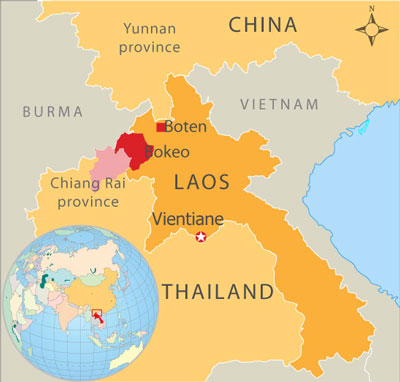




Lao officials have authorized a Chinese firm to develop a sprawling specific economic zone on the outskirts of the capital Vientiane, triggering resentment amongst some residents who say they were given no voice in the decision-making process.
The agreement, reached last week between the Lao government and the Wan Feng Shanghai real estate company, would see the firm invest 12 trillion kip (U.S. $1.5 billion) in the development of a tourism and cultural center in a 365-hectare (900-acre) portion of the That Luang Marsh area.
Wan Feng plans to create a large lagoon in the center of what will become a new urban area that will also include open spaces, a public park, a drainage site, several new roads, a sports center, and trade and service centers with five-star hotels, shopping centers, and entertainment venues.
The project, which is expected to take 15 to 20 years to complete from the beginning of construction in February, will also include a residential area. The first phase of the project will be built ahead of talks among leaders of the Asia-Europe Meeting (ASEM) forum to be hosted in November.
The developer said it will leave approximately 60 hectares (150 acres) of the 365 hectares undeveloped.
Mixed reaction
One resident of Vientiane told RFA that the plan to develop the That Luang Marsh would bring much-needed investment to the country, welcoming the move.
"In my personal opinion as a Laotian, I think the economic zone is good because Laos needs development,” he said.
“With no economic development, Laos will always remain poor. This is necessary."
But while some expect the new specific economic zone to bring prosperity to the country, not everyone is pleased about the government’s decision to grant the land without consulting the current residents.
Another resident of Vientiane, who asked to remain anonymous, said officials should not have signed an agreement for land they do not own the rights to.
"If all the land belonged to the government, there wouldn't be any problems. But in case of the land in That Luang Marsh, most of it makes up a residential area—some of the land belongs to the residents."
And a resident of southern Champassak province said the move was typical of the way the Lao government makes decisions that affect the lives of its people.
"If [the project] affects people's properties, that is not good. But the people can't say anything because it has already been approved by the government,” he said.
“In Laos, that's the way it is—the government makes decisions whether the people are happy or not. It doesn't matter."

Other concessions
The planned Chinese specific economic zone is not the first to open in Laos. Chinese firms operate concessions which include casinos in Luang Namtha province, on the border of China’s Yunnan province, and in northwestern Bokeo province on the border with Burma.
The Luang Namtha-based Golden Boten City Casino has been dogged by allegations that the business is linked to money laundering, murder, fraud, kidnapping, drugs, human trafficking, and the sex trade, but a private security force and “protection” from officials in the Lao central government with ties to the casino have allowed it to operate with impunity, according to sources.
In December 2010, investors announced the opening of another casino in Bokeo province involving a 10,000 hectare (24,710 acre) concession the Lao government granted to a Chinese group on a 99-year lease basis.
The resource-starved Lao government sees gambling as an easy way to bring in money from China that it can later use to develop the region. It has offered a number of tax breaks and land concessions to attract Chinese investments, which also include a number of rubber plantations.
The army has forced hundreds of Laotians off of their land to make room for foreign investment in specific economic zones.
Reported by RFA’s Lao service. Translation by Max Avary. Written in English by Joshua Lipes.